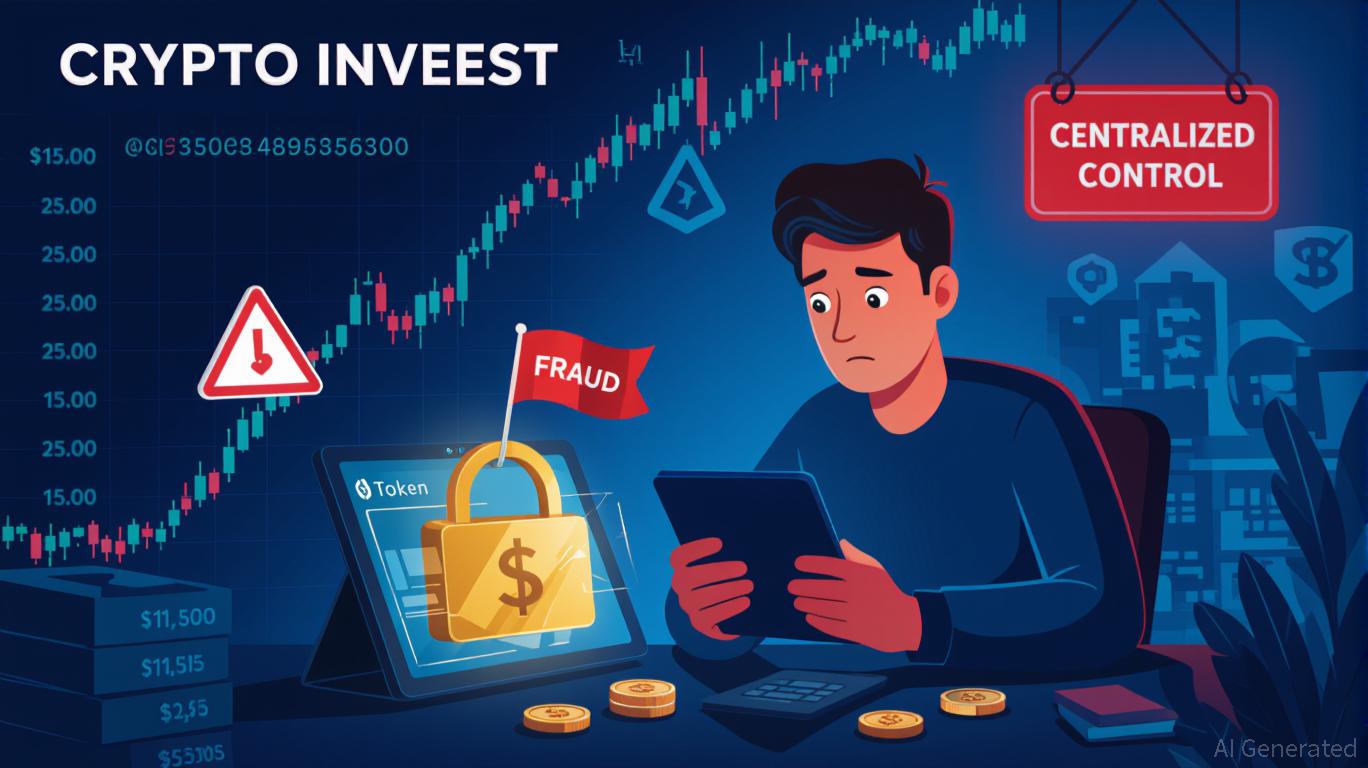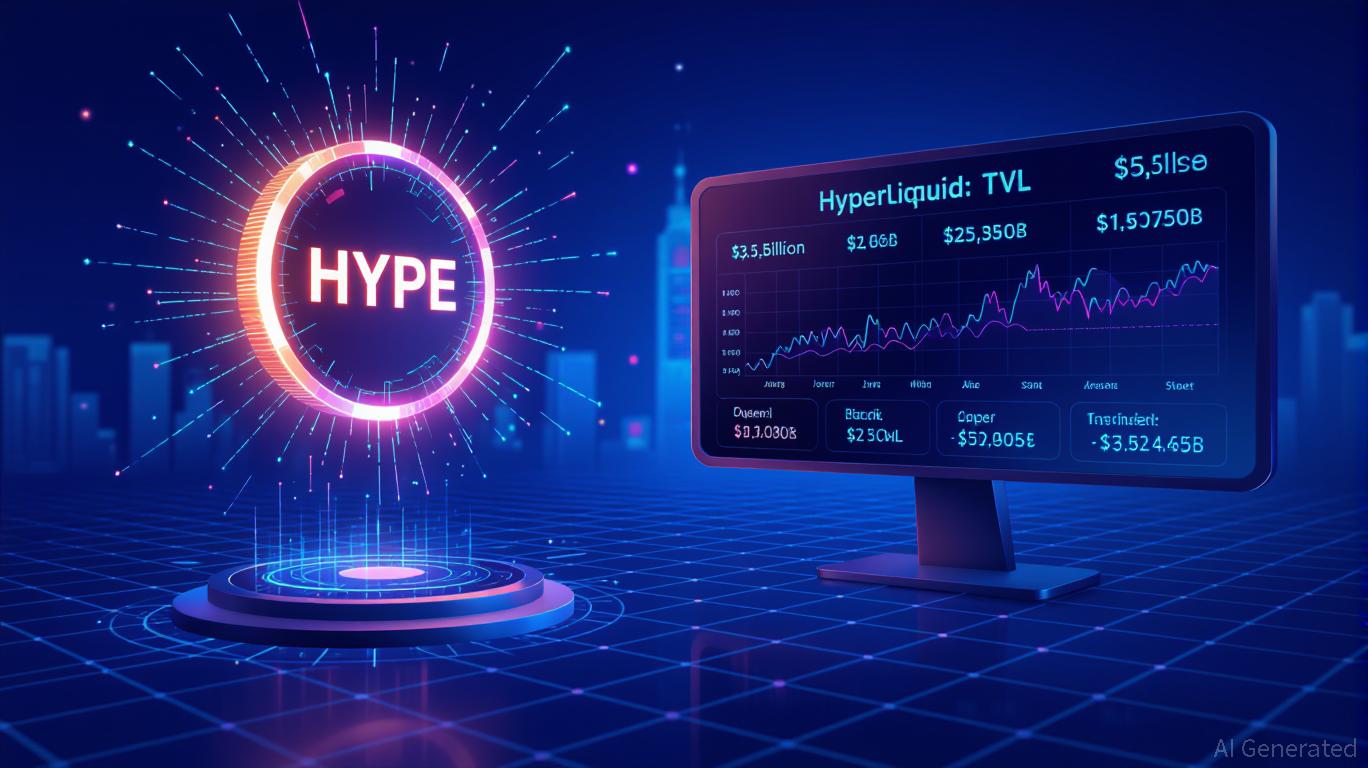COAI Token Fraud Aftermath and Cryptocurrency Research: Managing Uncertainty in an Unstable Market
- The 2025 crypto market faces a paradox: innovation coexists with rampant fraud, exemplified by the COAI Token scam linked to centralized manipulation and false AI claims. - COAI's 70% price surge masked 87.9% supply control by ten wallets, mirroring scams like MYX Finance, while Meta's platforms face scrutiny for enabling $15B daily scam ad traffic. - Investors now prioritize due diligence tools like triple-audited projects (XRP Tundra) and AI detectors (DeepSnitch) to identify red flags in governance an
The cryptocurrency landscape in 2025 is defined by a striking contradiction: groundbreaking advancements are happening alongside widespread fraudulent schemes. The controversy surrounding the COAI Token, associated with ChainOpera AI, has emerged as a stark warning for those investing in digital assets, highlighting weaknesses in decentralized finance (DeFi) and emphasizing the pressing necessity for thorough vetting processes. As the world’s financial markets deal with the aftermath, the central concern has shifted from if scams will arise to how investors can safeguard themselves amid a climate where instability and deceit are closely linked.
The COAI Token Scam: An Example of Centralized Manipulation
Promoted as a fusion of blockchain and AI, the COAI Token experienced a dramatic 70% price jump within a single day in October 2025, attracting retail investors with claims of cutting-edge AI-powered analytics, according to a
This pattern is reminiscent of other fraudulent projects like MYX Finance (MYX), where speculative hype leads to rapid price increases followed by sharp declines as investors exit. The COAI Token also saw a 1,308% surge in social media mentions in a single day, fueled by rumors of a Bitget listing and speculative trading, the report states. Yet, as one market observer remarked, "The real issue isn’t the token’s price—it’s the opaque nature of its management and technology."
Financial Impact: A Worldwide Challenge
The COAI Token is part of a larger wave of crypto-related scams that have drained billions from investors. In Malaysia, for instance, fraudulent activities involving e-commerce and cryptocurrencies on Meta’s platforms resulted in losses surpassing RM248 million between 2023 and August 2025, as highlighted in a
On a global scale, the UK reported that in 2023, 54% of financial losses from scams were linked to Meta’s platforms, according to the article. Although Meta has committed to reducing the share of scam-related ad revenue from 10.1% in 2024 to 7.3% in 2025, the article observes that significant harm has already occurred. The takeaway for investors is clear: platforms that benefit financially from fraudulent activity are unlikely to make user safety a top priority.

Crypto Due Diligence: Essential Steps for 2025
Following the COAI Token debacle, conducting thorough due diligence has become indispensable for anyone investing in crypto. Projects such as
Another innovative resource is DeepSnitch AI, which leverages machine learning to identify rug pulls and fraudulent behavior as it happens, according to a
Risk Management Approaches: Looking Beyond Individual Tokens
Diversifying investments continues to be a fundamental risk reduction tactic in 2025. More investors are spreading their funds across the broader crypto sector instead of focusing on single tokens. This includes investing in blockchain infrastructure providers, security technologies, and compliance solutions, as discussed in a
Utilizing real-time data is also becoming increasingly important. APIs that supply on-chain analytics and market insights are now vital for making informed investment choices, according to a
Investor Safeguards: Insights from the SIFMA Podcast
The SIFMA Podcast episode Tokenized Securities: The Case for Investor Protection highlights the critical role of clear regulations in the digital asset sector, as referenced in a
Academic studies reinforce this perspective. Research on Cryptocurrency dynamics during global crises found that Bitcoin’s status as a digital safe haven strengthened after the COVID-19 pandemic and during the Russia–Ukraine conflict, as reported in a
Conclusion: The Need for Constant Vigilance
The COAI Token incident serves as a powerful reminder that innovation and fraud can go hand in hand in the crypto world. For investors, the way forward involves meticulous research, diversified holdings, and the use of tools that boost transparency. As the industry matures, both regulatory measures and technological advancements will be crucial in reducing risks. The real issue is no longer whether scams will happen, but whether investors are ready to detect and respond to them before suffering losses.
Disclaimer: The content of this article solely reflects the author's opinion and does not represent the platform in any capacity. This article is not intended to serve as a reference for making investment decisions.
You may also like
Hyperliquid's 2025 Boom: Blockchain-Based Liquidity and Shifting Retail Trading Trends
- Hyperliquid's TVL surged to $5B in Q3 2025, capturing 73% of decentralized perpetual trading volume via on-chain liquidity and retail demand. - Technological innovations like HyperEVM and strategic partnerships drove $15B open interest, outpacing centralized rivals' combined liquidity. - Retail traders executed extreme leverage (20x BTC/XRP shorts) and $47B weekly volumes, highlighting both platform appeal and liquidation risks. - Institutional interest (21Shares ETF application) and deflationary tokenom

U.S. Pursues Five-Year Prison Terms in Cryptocurrency Privacy Lawsuit, Challenging Developer Responsibility
- U.S. prosecutors seek 5-year sentences for Samourai Wallet co-founders over $237M crypto laundering via privacy tools. - Case highlights DOJ's strategy to hold crypto platform operators liable for criminal user activity, mirroring Tornado Cash legal battle. - Defense argues for reduced sentences citing cooperation, while prosecutors emphasize deterrence against privacy-focused financial innovation. - Outcome could set precedent for developer liability in DeFi, balancing privacy rights with regulatory com

Atlanta Hawks' Financial Management Questioned Amid Former Executive's Fraud Allegations
- Atlanta Hawks' ex-finance VP Lester Jones pleaded not guilty to wire fraud charges, accused of embezzling $3.8M via falsified expense claims and corporate credit card abuse. - Prosecutors allege Jones manipulated emails/invoices to conceal luxury travel, apparel, and vehicle costs as business expenses during 2021-2024 tenure. - Case highlights corporate governance flaws, as expense verification teams couldn't view actual credit card transactions until July 2024, enabling prolonged fraud. - Hawks remain s
NEAR Holds $2: Will It Soar 350% or Wait Until 2026?
- NEAR Protocol's token stabilizes near $2 support as network fees surge to $22.7M over three years, signaling strong user adoption. - Analysts highlight 350% bullish potential if price holds above $2, contrasting with broader crypto market consolidation. - Growing developer activity and fee generation suggest NEAR's ecosystem is insulating it from sector-wide volatility. - On-chain metrics and macro trends position NEAR as a potential outperformer if $2 support holds through 2025-2026.
